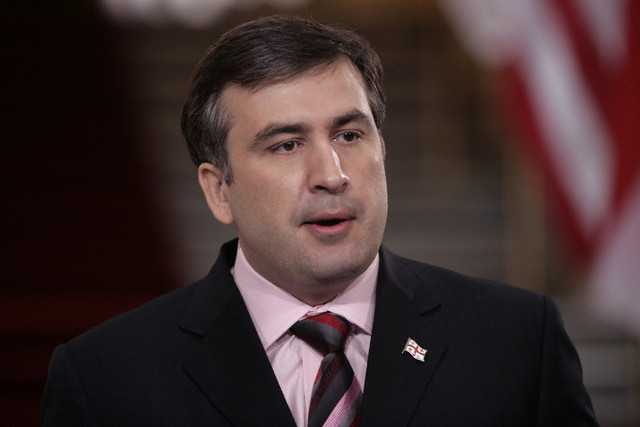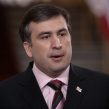
RIVAL GEORGIAN MINISTERS CROSS SWORDS
Publication: Eurasia Daily Monitor Volume: 2 Issue: 7
By:

Last week, Georgian President Mikheil Saakashvili was forced to mediate between two bickering members of his government. Ultimately, Saakashvili reached a temporary truce in the standoff between Defense Minister Irakli Okruashvili and his predecessor, Gia Baramidze, currently State Minister for European Integration. Baramidze had replaced Okruashvili in a December ministerial reshuffle (see EDM, December 15).
The conflict erupted on January 4 when Okruashvili told a news conference about large-scale corruption in Baramidze’s Ministry of Defense, including embezzlement. Okruashvili, who claimed to have inspected almost all military units, painted a gloomy picture of the Georgian armed forces and asserted that, thanks to corrupt officials, the Georgian army today is in worse condition than it was before the Rose Revolution.
In his customary bellicose style, Okruashvili told journalists that he would like to see several top ministry officials, including ex-deputy minister Paata Gaprindashvili and Akaki Chkhenkeli, director of the Army Development Fund under President Saakashvili, in jail within a month. Most of the men he named had been members of Baramidze’s team. Okruashvili reported that documents implicating ministry officials in corruption have been sent to the Prosecutor-General’s Office (TV-Rustavi-2, TV-Imedi, Media News, January 4).
In addition to the misuse of funds allocated for the renovation of barracks and the Ministry of Defense headquarters, Okruashvili discovered that the ministry has no accurate inventory of weapons and military ammunition or any precise data regarding personnel levels. Okruashvili condemned the long-time practice of “drafting” fictitious soldiers into the army as a money-making scheme hatched by corrupt defense officials (TV-Rustavi-2, January 3).
In a separate interview with Rustavi-2 on January 4, Okruashvili described Baramidze as an honest but incompetent leader who had been deceived by his subordinates.
Baramidze hit back by his own news briefing on January 6. Sources say that he cleared the press conference with Prime Minister Zurab Zhvania. Baramidze presented his own data regarding Ministry of Defense spending under his leadership, and they drastically differed from the figures aired by Okruashvili. Moreover, Baramidze accused Okruashvili of jeopardizing the unity of the Georgian government and violating the rules of team play, the management model that Europe-leaning Georgia is trying to establish in governance. According to Baramidze, Okruashvili’s allegations of corruption virtually disavowed repeated statements by President Saakashvili and other leaders about rapid progress in building the Georgian army. He said that Okruashvili “has no right to don a prosecutor’s robe and say that he wants to see some people in prison.” The statement referred to Okruashvili’s brief stint as Prosecutor-General following the Rose Revolution.
On his return to Tbilisi on January 6, Saakashvili held a closed-door meeting with Zhvania for several hours before convening a special media briefing attended by Zhvania, Baramidze, and Okruashvili.
Saakashvili scolded the ministers for squabbling and underlined the importance of government unity. Saakashvili praised Baramidze’s performance in the Defense Ministry, while reminding him of unsolved problems and Okruashvili’s mandate to solve them. Saakashvili indirectly scolded Zhvania for his apparent inability to keep order in the government while the President was away. “There are certainly no irreplaceable people in the country and we have many new good employees” he added (TV- Channel 1, Rustavi-2, January 6). Ironically, when he appointed Okruashvili as defense minister, Saakashvili had given his “presidential promise,” that Okruashvili would remain in office until Georgia’s territorial integrity had been restored.
For now, the government awaits the results of the investigation into the alleged abuses in the Ministry of Defense currently underway by the Prosecutor-General’s Office and the Control Chamber, parliament’s watchdog. Their findings will likely determine which of the two men has accurately assessed the situation. Notably, one day after the dispute erupted, Okruashvili sacked his newly appointed deputy, Kakha Maisuradze, who reportedly had misinformed him about the financial abuses (Alia, January 7).
Most local analysts and politicians view the conflict between Okruashvili and Baramidze as a reflection of a hidden confrontation between Zhvania’s team and Saakashvili’s team, despite their claims of complete governmental harmony. Okruashvili is one of Saakashvili’s closest confidants, while Baramidze is Zhvania’s favorite. Sources say that the conflict between Baramidze and Okruashvili has personal dimensions and began during the unsuccessful military campaign in South Ossetia last August. After that debacle, Okruashvili criticized Baramidze several times through media statements (Akhali Taoba, January 7).
Analysts and politicians, including those of the ruling National Movement, tend to believe that a televised public reconciliation between Baramidze and Okruashvili would hardly stop the deepening rift between Zhvania’s and Saakashvili’s associates. Moreover, they predict the eventual dissolution of the ruling party’s overwhelming — yet fragile — majority in parliament.
One influential parliamentarian and Zhvania protege, Vasil Maglaperidze, commented, “Those who exclude the appearance of new factions in the parliament merely do not understand politics . . . By the end of the year, we will also have new faces in the government” (Alia, January 8). Some analysts say that even Okruashvili might lose his job because his ambitions and hawkish views increasingly run against government policy (Akhali Versia, January 7).
Unfortunately, one of the main losers in this standoff is the Georgian army, which has seen three defense ministers since the November 2003 Rose Revolution and few positive results.




